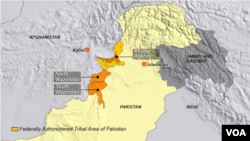Pakistan has rejected as "utterly baseless" U.S. allegations that it still has sanctuaries for militants that are detrimental to Afghan and regional stability.
In its biannual war assessment mandated by the U.S. Congress, the Department of Defense said that Taliban attacks in Afghanistan launched from sanctuaries primarily in the tribal areas of neighboring Pakistan remain a serious problem.
The report goes on to assert that “Afghan- and Indian-focused militants” continue to operate from Pakistani soil to undermine Afghan and regional stability. It also alleges that Islamabad uses these proxy forces to “hedge against the loss of influence in Afghanistan and to counter India’s superior military.”
But Pakistan has sharply criticized the findings of the U.S. report. Foreign Ministry spokeswoman Tasnim Aslam, speaking to reporters Thursday, rejected the allegations as “utterly baseless” and “unsubstantiated”. She says Pakistan’s objections have been formally conveyed to the United States through its ambassador in Islamabad.
Unquestionable resolve
The spokesperson added that ongoing counter-militancy operations near the Afghan border, particularly in North Waziristan, clearly demonstrate Pakistan’s unquestionable resolve to eliminate terrorists from its soil.
“We are in the midst of a very comprehensive law enforcement [army] operation against terrorists, known as Zarb-e-Azb. We have repeatedly said that we are not making any distinction in our operations against terrorists no matter to which organization they may belong,” she said.
Aslam, in turn, accused the United States and Afghan security forces of not effectively guarding their side of the border against militant movements. She stated that both were “specifically” asked to take corresponding action on their side of the border before Pakistan undertook the Waziristan offensive in June.
“… the unfortunate fact that we did not receive the cooperation that we expected, which would have been in the interest of not just peace and stability in Pakistan but also in Afghanistan. Despite that background, this kind of baseless allegation in a report to the U.S. Congress is unacceptable to Pakistan,” she said.
The U.S. Defense Department report has also acknowledged that Pakistan’s military has made gains against the Pakistani Taliban and foreign fighters entrenched in the tribal areas on the Afghan border.
Haqqani Network
American and Afghan officials have long alleged the Haqqani Network of insurgents fighting along side the Taliban in Afghanistan is based in North Waziristan.
But Pakistani authorities say the network has been uprooted and its fighters have been evicted from the area. Haqqani fighters are blamed for some of the deadliest and highest-profile attacks against U.S. and coalition forces.
Speaking to reporters in Washington through a videoconference on Wednesday, Commander of the International Assistance Force Joint Command, Lieutenant General Joseph Anderson supported Pakistani assertions.
As he put it, the Pakistan army operations in North Waziristan have “fractured” the Haqqani Network and disrupted their efforts in Afghanistan, causing them "to be less effective in terms of their ability” to launch attacks, particularly in Kabul.












